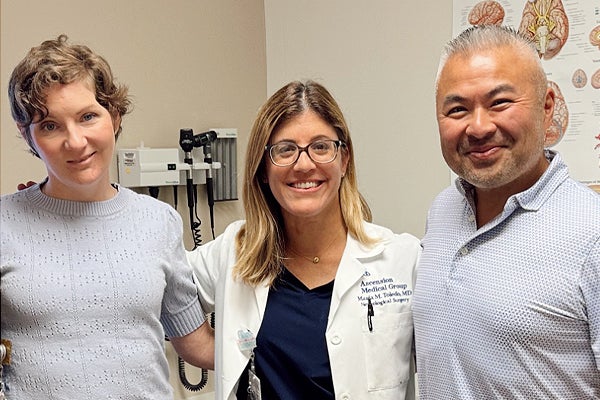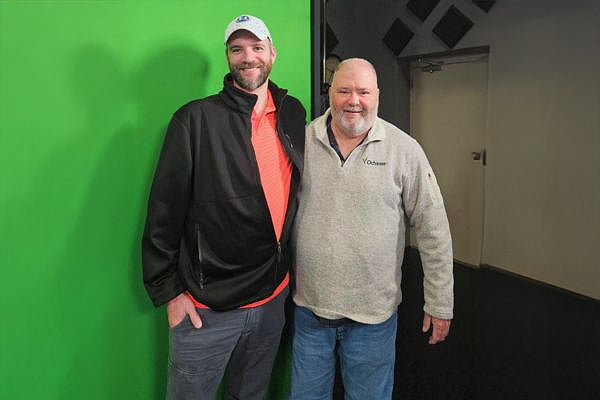Cardiologist answers questions you may have about AFib

Dr. Adam Bainey, cardiac electrophysiologist at Ascension Sacred Heart in Miramar Beach, Florida answers your common questions about AFib.
Dr. Adam Bainey is a board certified cardiac electrophysiologist with Ascension Medical Group Sacred Heart Cardiology Miramar Beach and performs minimally-invasive heart procedures to treat AFib at Ascension Sacred Heart Emerald Coast.
Do you know the symptoms of having an irregular heart rhythm? One of the most common heart conditions people have is atrial fibrillation (AFib). The condition can create blood clots in your heart and increase your risk of stroke and heart failure. Cardiac electrophysiologist, Adam Bainey, DO, at Ascension Sacred Heart in Miramar Beach, Florida, answers some common questions people have about AFib and the importance of finding care if you are experiencing symptoms.
What happens when you go into AFib?
When AFib happens, the top chamber of your heart stops beating normally. So a normal contraction, you know, you have good expulsion of blood from the top chamber into the bottom chamber, which then pumps out blood to the entire body. When you're going into AFib it just quivers. This quiver is what causes the strokes and AFib because it ends up clotting, building up and then pieces break off. That's why we care so much about stroke prevention and AFib.
What are the warning signs of AFib?
The most common thing that patients tend to complain of is a palpitation or like a fluttering sensation in the chest. Patients also have a common feeling of fatigue. What most would attribute to age and getting older, a lot of times the fatigue can just be a result of the AFib. Youmay have shortness of breath or dyspnea exertion, which is shortness of breath when exerting yourself in an activity.
Other symptoms you should look for may include chest pain, sweating, fatigue, shortness of breath and weakness.
Is AFib life threatening?
The most concerning thing with AFib is if you are experiencing a stroke, which can be life threatening.That’s why it’s important to monitor AFib conditions with the wearable devices is to try to detect patients who have AFib before they end up with a stroke.
The first step in getting treatment for stroke quickly is recognizing the warning signs.
- Balance: Check for sudden loss of balance
- Eyes: Ask if vision is lost or unclear
- Face: Look for face drooping, or an uneven smile
- Arm: Check for arm weakness
- Speech: Listen for speech difficulty
- Time: Time to call 911 right away
If you experience signs of a stroke, call 9-1-1 or go to the nearest emergency room.It could make a meaningful, perhaps life-saving, difference.
Can AFib go away?
AFib may come and go and affect how your heart pumps blood through your body, increasing your risk for stroke and congestive heart failure. Your doctor can help do things that can help control the symptoms.
If AFib goes away on its own that's what's called a paroxysmal atrial fibrillation (AFib) and that will continue to progress to what becomes more persistent.
If you are in AFib, a cardioversion is often used to shock the heart back into normal rhythm. The procedure shocks the heart back into a normal rhythm.
If you are diagnosed with heart arrhythmias, Ascension Sacred Heart offers minimally invasive treatment options.
What to do if you are having symptoms?
Heart care can’t wait. When you notice a change in your heartbeat, such as a flutter or quiver in your chest, start a conversation about your new symptoms with a cardiologist at Ascension Sacred Heart. Our doctors use the EKG test to help detect an irregular heartbeat. We provide many heart tests for AFib and other cardiovascular diseases. Our doctors listen to understand you and your health concerns. Then, we work with you to create a personalized care plan that’s right for you.
Find a doctor who listens
Your heart care is important. To deliver personalized care, your cardiologist at Ascension Sacred Heart starts by listening to understand you, your health history and your goals. We take the time to answer all your questions — big and small. Remember to tell your doctor how you are feeling at each visit. By getting to know you, we deliver heart care that’s right for you. To find a heart doctor visit ascension.org/PensacolaHeart.
Last updated: October 15, 2024


